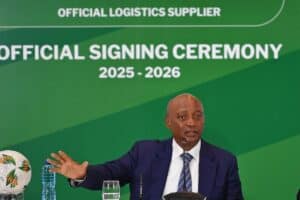No-one expects ‘load shedding’ will permanently cease because of any march. But Ramaphosa can make good use of his time away from Davos

Will next week’s planned march on ANC headquarters in Johannesburg elicit threats and violence, as happened in 2014 when Democratic Alliance (DA) supporters headed for Luthuli House?
In the build-up to the May 2014 elections, the DA announced a march to highlight ANC failures under then-president Jacob Zuma. In reply, the ANC warned that it would not be able to control what its members might do in response to a provocative publicity stunt.
The Johannesburg Metro Police Department tried to ban the march, but this was overturned after a DA court challenge. With its constitutional right to march affirmed, the DA went ahead.
However, approaching Luthuli House, marchers were confronted by stone-throwing ANC supporters, thousands of whom had been bused in to defend their headquarters.
ALSO READ: ‘Stage 6 takes your power, take the ANC’s power’ – DA protest confirmed
According to a Reuters report: “Police, between the lines of rival supporters, opened fire briefly at ANC members clad in the party’s yellow T-shirts. A police spokesperson said petrol bombs were also thrown at officers who responded with stun grenades and rubber bullets.”
After this brief skirmish, the march was called off. As Shakespeare’s Falstaff notes in Henry IV Part 1: “Discretion is the better part of valour”. Sometimes it’s wisest to back off. Much has changed since 2014.
Last year, a group of ANC members marched to Luthuli House – against President Cyril Ramaphosa. The ANC is deeply divided. There’s no telling what the factional responses to a DA march might be.
Over the weekend, social media posts depicted a man in ANC colours calling for a march to Megawatt Park, Eskom’s head office. That would be absurd, but not unprecedented. They would be marching against Eskom, an organisation ruined and robbed by the ANC. As if the ANC hasn’t been in charge for nearly 29 years.
People are beyond gatvol with rolling blackouts. The urge to “do something” is palpable.
Ramaphosa’s decision to stay in SA rather than attend the World Economic Forum in Davos would be more meaningful if he had a better track record on Eskom. His credibility has been shredded by empty promises. And it’s not as if he shares our plight.
ALSO READ: ‘Eskom’s heavyweights as powerless as you and I in solving power crisis’
BusinessTech carried a misleading headline: “Ramaphosa skips Davos to sit in the dark with the rest of South Africa.” In fact, Ramaphosa does not sit in the dark. His home, in my ward, is not “load shed”.
The latest bout of “load shedding” has hammered businesses, hospitals, schools and households with up to 12 hours a day of planned outages, plus the extra hours when City Power and Eskom struggle to restore power.
Equipment at substations large and small wasn’t designed to be switched on and off four or more times a day. It can’t cope. We really need to let off steam.
Neither the ANC nor Eskom is capable of fixing the nation’s electricity supply. No-one expects “load shedding” will permanently cease because of any march.
But here’s how Ramaphosa can make good use of his time away from Davos. Zuma, as ANC leader in 2014, set the tone for the Luthuli House skirmish. His successor can set a different tone, to help ensure next week’s march is peaceful.
Support Local Journalism
Add The Citizen as a Preferred Source on Google and follow us on Google News to see more of our trusted reporting in Google News and Top Stories.






